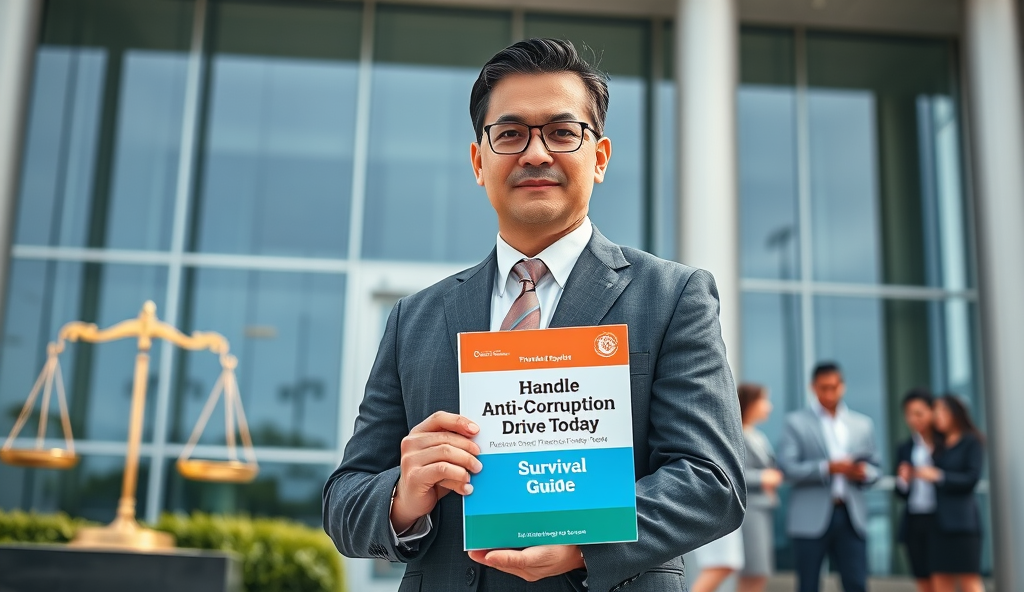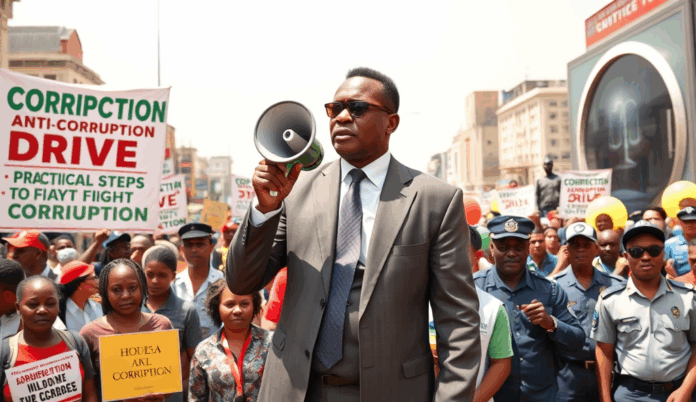Introduction to Nigeria’s Anti-Corruption Drive under President Buhari
President Muhammadu Buhari’s anti-corruption drive, launched in 2015, became a cornerstone of his administration, targeting systemic graft through agencies like the EFCC and ICPC. The campaign recovered over N800 billion in stolen funds by 2021, signaling a strong stance against financial crimes in Nigeria.
Key initiatives included the Whistleblower Policy, which incentivized citizens to report corruption, leading to high-profile prosecutions of former officials. However, critics argue selective enforcement and slow judicial processes have limited the fight against corruption in Nigeria.
This anti-graft effort set the stage for deeper scrutiny of Nigeria’s corruption challenges, which have historical roots explored in the next section. The Buhari era marked a pivotal shift in public sector accountability, though its full impact remains debated.
Key Statistics

Historical Context of Corruption in Nigeria
President Muhammadu Buhari's anti-corruption drive recovered over N800 billion in stolen funds by 2021 signaling a strong stance against financial crimes in Nigeria.
Nigeria’s corruption challenges trace back to colonial-era administrative structures that prioritized resource extraction over accountability, creating fertile ground for graft post-independence. The 1970s oil boom exacerbated this, with public funds often diverted through inflated contracts and kickbacks, establishing patterns that persist today.
Military regimes between 1966-1999 institutionalized corruption through unchecked power, with Transparency International estimating $400 billion was embezzled during this period. Civilian governments inherited these systemic flaws, struggling to dismantle entrenched networks despite establishing agencies like the EFCC in 2003.
This historical backdrop explains why Buhari’s anti-corruption drive faced structural resistance, as explored in the next section’s policy analysis. Decades of normalized graft created complex challenges for financial crimes enforcement in Nigeria.
Key Policies and Initiatives of Buhari’s Anti-Corruption Campaign
The 1970s oil boom exacerbated corruption with public funds often diverted through inflated contracts and kickbacks establishing patterns that persist today.
Building on Nigeria’s entrenched corruption legacy, Buhari launched the Whistleblower Policy in 2016, recovering over N594 billion within two years through citizen-led reports on financial crimes. His administration strengthened the EFCC and ICPC, securing 1,630 convictions between 2015-2020, including high-profile cases like former governors Joshua Dariye and Jolly Nyame.
The Treasury Single Account (TSA) policy consolidated 20,000 government bank accounts, reducing graft opportunities by tracking ₦8 trillion in public funds digitally. However, critics argue these measures faced implementation gaps, with recovered funds sometimes disappearing back into the system.
These structural reforms set the stage for examining tangible outcomes in Nigeria’s fight against corruption, as detailed in the next section on notable achievements. The policies demonstrated political will but grappled with systemic resistance from networks benefiting from graft.
Notable Achievements in the Fight Against Corruption
The Whistleblower Policy in 2016 recovered over N594 billion within two years through citizen-led reports on financial crimes.
The Buhari administration’s anti-corruption drive recorded significant milestones, including the recovery of $322 million in Abacha loot through international collaborations, later invested in social programs like the Conditional Cash Transfer scheme. High-profile convictions like ex-SGF Babachir Lawal and former petroleum minister Diezani Alison-Madueke demonstrated unprecedented accountability for top officials previously considered untouchable.
Digital reforms like the Bank Verification Number (BVN) system exposed 50,000 fraudulent payroll entries, saving ₦120 billion annually in ghost worker payments. The EFCC’s prosecution rate surged by 40% between 2015-2020, with 90% conviction success for completed cases involving politically exposed persons.
While these achievements marked progress, persistent loopholes in asset recovery and case delays revealed systemic vulnerabilities that would later dominate criticisms of the anti-graft war. These operational gaps set the stage for examining the challenges facing Nigeria’s corruption fight in subsequent sections.
Challenges and Criticisms Facing the Anti-Corruption Drive
Digital reforms like the Bank Verification Number (BVN) system exposed 50000 fraudulent payroll entries saving ₦120 billion annually in ghost worker payments.
Despite the EFCC’s 90% conviction rate for completed cases, prolonged trials became a major criticism, with high-profile cases like Diezani Alison-Madueke’s spanning multiple administrations without final resolution. The selective prosecution of opposition figures while allies faced lighter scrutiny fueled perceptions of political bias, undermining public confidence in the anti-graft war.
Asset recovery efforts were hampered by legal loopholes, as seen when ₦1.4 trillion in recovered funds remained unaccounted for in 2020 due to weak tracking systems. International partners like the World Bank noted Nigeria’s struggle to implement transparent mechanisms for repatriated loot, slowing down collaborative recoveries.
These systemic weaknesses directly impacted citizen trust, setting the stage for examining public perception in subsequent sections. Persistent case delays and inconsistent enforcement overshadowed the administration’s earlier achievements, revealing deeper institutional challenges in Nigeria’s fight against corruption.
Public Perception and Trust in the Anti-Corruption Efforts
Public trust in Nigeria's anti-corruption drive declined significantly with a 2021 NOIPolls survey showing only 32% of citizens believed the EFCC was effective.
Public trust in Nigeria’s anti-corruption drive declined significantly, with a 2021 NOIPolls survey showing only 32% of citizens believed the EFCC was effective, down from 54% in 2016. The prolonged Diezani case and unaccounted ₦1.4 trillion recovery gaps reinforced skepticism about political will to prosecute high-profile offenders.
Transparency International’s Corruption Perception Index ranked Nigeria 154th out of 180 countries in 2022, reflecting persistent doubts despite increased convictions. Many Nigerians viewed selective prosecutions as evidence the anti-graft war targeted opposition figures while shielding allies.
These trust deficits created a paradox where corruption cases increased but public belief in systemic change dwindled, setting the stage for comparing this administration’s performance with predecessors. The next section examines whether these challenges are unique or recurring patterns in Nigeria’s fight against corruption.
Comparative Analysis with Previous Administrations
The Buhari administration recorded 3,615 convictions between 2015-2022, surpassing Obasanjo’s 2003-2007 tally of 2,000 cases, yet public perception remains worse than during Yar’Adua’s tenure when Nigeria improved 15 places on Transparency International’s index. While Jonathan’s administration recovered ₦7.6 billion in 2014 alone, Buhari’s regime announced ₦1.9 trillion recoveries, though the unaccounted ₦1.4 trillion gap fuels skepticism about transparency.
Unlike past governments that focused mainly on financial crimes, this administration expanded anti-corruption efforts to include asset recovery and whistleblower policies, yet maintained the recurring pattern of high-profile cases stalling in court. The EFCC secured 2,848 convictions under Buhari compared to 631 during Jonathan’s era, but selective prosecution accusations persist across administrations.
These historical patterns suggest Nigeria’s fight against corruption consistently grapples with perception gaps despite operational improvements, raising questions about whether international partnerships could provide the systemic change citizens demand. The next section examines how global collaborations influence Nigeria’s anti-graft war beyond domestic limitations.
Role of International Partnerships in Combating Corruption
Nigeria’s collaboration with the Stolen Asset Recovery Initiative (StAR) has facilitated the return of $311 million Abacha loot since 2020, demonstrating how global alliances supplement domestic anti-graft efforts. However, these recoveries represent just 12% of the estimated $5 billion stolen during Abacha’s regime, highlighting persistent gaps in international asset tracking.
The UK’s 2016 MoU with Nigeria enabled direct repatriation of £4.2 million Ibori loot, bypassing lengthy legal processes that often stall high-profile cases domestically. Such partnerships address systemic weaknesses in Nigeria’s judiciary but raise concerns about conditionalities attached to recovered funds.
While the US Department of Justice helped freeze $480 million in Nigerian assets abroad between 2015-2020, these collaborations must evolve beyond recovery to capacity-building for sustainable impact. The next section explores whether these international mechanisms can fundamentally reshape Nigeria’s anti-corruption drive beyond temporary gains.
Future Prospects for Nigeria’s Anti-Corruption Drive
Nigeria’s anti-corruption efforts must transition from asset recovery to systemic reforms, leveraging lessons from international partnerships like the StAR initiative to strengthen domestic institutions. The EFCC’s conviction rate of 1,200 cases between 2015-2022 shows progress, but persistent delays in high-profile trials reveal structural weaknesses requiring judicial overhauls.
Emerging technologies like blockchain for public procurement and AI-powered fraud detection could revolutionize transparency initiatives in Nigeria, building on the whistleblower policy’s success in recovering ₦594 billion since 2016. However, these innovations require sustained political will beyond the Buhari administration to institutionalize anti-graft mechanisms.
The next section evaluates whether these evolving strategies have fundamentally altered Nigeria’s corruption landscape or merely achieved temporary gains, analyzing Buhari’s legacy in the fight against corruption.
Conclusion on the Effectiveness of Buhari’s Anti-Corruption Efforts
While President Buhari’s administration secured notable convictions, including high-profile cases like former governors and public officials, critics argue progress remains uneven due to delayed trials and perceived political bias. The EFCC’s recovery of over N800 billion in looted funds demonstrates tangible wins, yet systemic corruption persists in sectors like oil and public procurement.
Public trust in Nigeria’s war on corruption has wavered, with Transparency International’s 2022 index ranking Nigeria 150th out of 180 countries, reflecting lingering challenges. Whistleblower policies and asset recovery initiatives show promise, but enforcement gaps and weak judicial processes undermine long-term impact.
Moving forward, sustained political will and institutional reforms are critical to consolidating gains from anti-graft campaigns. The next phase must address accountability loopholes while empowering agencies like the EFCC to operate without interference.
Frequently Asked Questions
How can ordinary Nigerians report corruption safely under the current Anti-Corruption Drive?
Use the EFCC's anonymous whistleblower portal (efcc.gov.ng) or call 08006332233 with encrypted evidence like audio recordings or bank statements.
What practical steps can I take to avoid being involved in corrupt practices at work?
Maintain detailed records of all transactions and use the ICPC's Anti-Corruption Transparency Unit (ACTU) guidelines for reporting suspicious requests through secure channels.
How do I verify if recovered looted funds are being properly utilized in my community?
Track allocations through the Open Treasury Portal (opentreasury.gov.ng) and cross-check with your state's Public Procurement Bureau for project implementation details.
Can I get protection if I expose corruption in my government office?
Yes file reports through the Witness Protection Program under the Administration of Criminal Justice Act 2015 while documenting threats with timestamped videos as evidence.
What digital tools can help me monitor corruption risks in local projects?
Use BudgIT's Tracka platform (tracka.ng) to follow project timelines and report discrepancies via their verified social media handles with geotagged photos.


